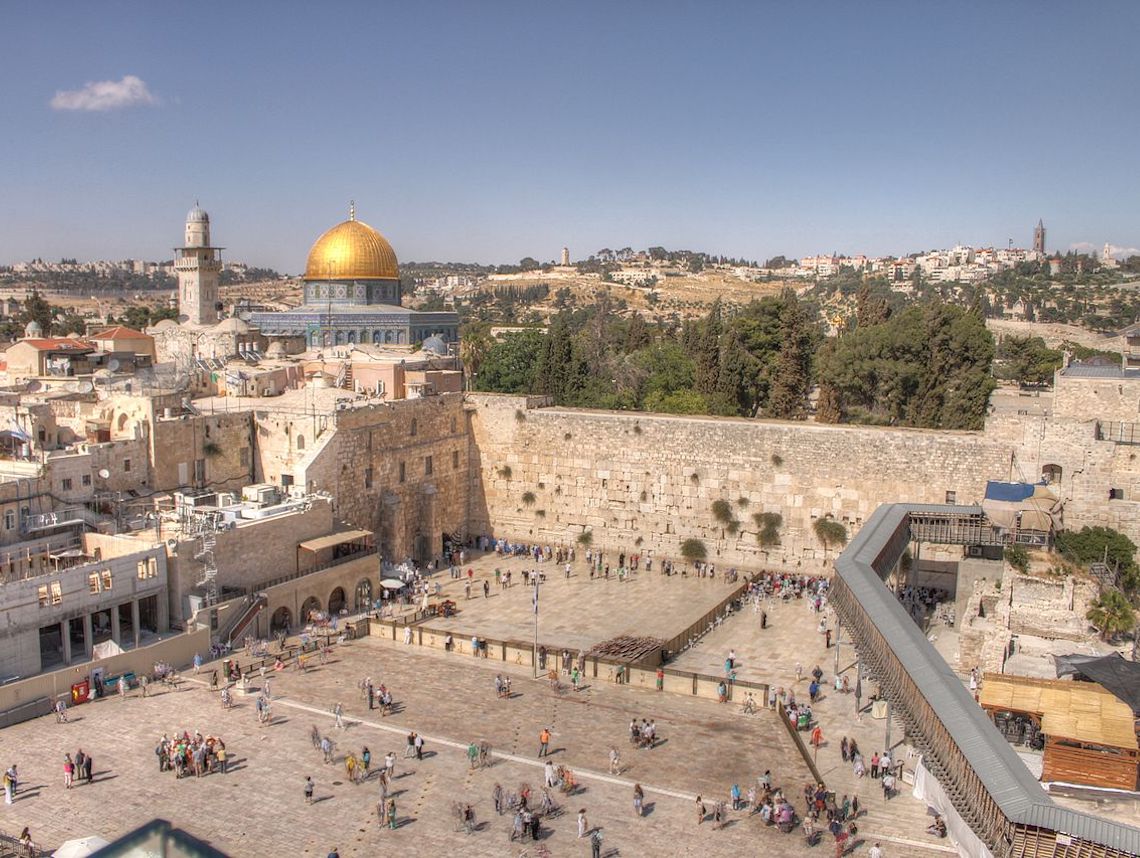 The Western Wall and Dome of the Rock in the old city of Jerusalem. Photo via WikiCommons
The Western Wall and Dome of the Rock in the old city of Jerusalem. Photo via WikiCommons The fact that Israeli officials and Jewish leaders in the Diaspora are butting heads again — this time after the suspension of an agreement to create an egalitarian prayer space at the Western Wall — is no surprise to Jay Sanderson.
“Israelis don’t understand the challenges American Jews face, and American Jews don’t always understand challenges Israelis face, and this is symbolic of that,” the CEO of The Jewish Federation of Greater Los Angeles said.
But that doesn’t mean American Jews are any more likely to condone recent events. During a town hall meeting on June 29, Rep. Brad Sherman (D-Sherman Oaks) lambasted the Jewish state’s action.
“It’s outrageous,” he said in response to a question from the Journal, “and it shows Israel … [kowtowing] to a few and to the extreme right of the religious spectrum.”
“I think this is something that a number of us [are] trying to meet with the Israeli ambassador [about] to drive home how important this is to Israel’s relationship with American Jews,” Sherman added.
Rep. Adam Schiff (D-Burbank) called the decision “distressing and unfortunate.”
“Both as a member of Congress committed to Israel’s security and as a Jew who feels a profound connection to Israel as the homeland of the Jewish people, I urge the Israeli government to reconsider this decision,” Schiff said.
At issue is a June 25 vote in which the Israeli Cabinet decided to freeze a plan promoting a pluralistic prayer space, reversing course on a January 2016 agreement. The plan called for expanding the non-Orthodox prayer space at the Kotel where men and women can worship and placing it under interdenominational control. The suspension of the agreement was viewed widely as a capitulation to the ultra-Orthodox parties that form part of Prime Minister Benjamin Netanyahu’s coalition government.
Consul General of Israel in Los Angeles Sam Grundwerg said Israel is concerned about issues important to American Jews and stressed the “deep appreciation Israel has for Jewish communities in the Diaspora.”
Still, he said, political realities sometimes compel the Israeli government to take steps that may not sit well with Jews outside of Israel. “What we witnessed … is an unfortunate example of that,” he said.
Grundwerg added that recent events are not as negative as some may perceive them to be.
“The Western Wall agreement was not canceled or nullified. It was suspended and frozen. As a matter of fact, the prime minister has instructed to move forward at this time with the physical construction of the space for egalitarian prayer,” he said. “That may sound like merely a technical distinction, but it’s still a distinction that’s important because efforts to find a satisfactory solution are ongoing.
“Nullification of the agreement is something the ultra-Orthodox parties would have preferred. People have talked about the capitulation to the ultra-Orthodox. Full capitulation would have been to nullify, not to suspend, it.”
Richard Sandler, board of trustees chair at The Jewish Federations of North America, was in Israel participating in the Jewish Agency for Israel board of governors’ meetings when Israel announced the suspension. Afterward, he took part in meetings with Israeli officials.
“It was, in many ways, extraordinary in terms of how quickly everybody was able to meet,” Sandler said. “[Israeli officials] showed concerns about our reaction and made themselves available.”
Sandler and Israeli officials also discussed legislation advanced June 25 that would, if passed, give the Chief Rabbinate a monopoly over conversions, critics say.
Less than a week later, on June 30, the Israeli government announced plans to shelve the conversion bill for six months. Sandler and Sanderson welcomed the development.
“There’s a lot of work to be done, there’s a long way to go, but I do appreciate how we got to this step,” Sandler said.
“We have to be cautiously optimistic that the worst-case scenario did not happen,” Sanderson said.
Barbara Kavadias, executive director of the Masorti Foundation for Conservative Judaism in Israel, said support for the Masorti movement is more important than ever in the wake of developing events in the Jewish state. Her organization, based in New York, provides funding and support to the Masorti movement in Israel and pays the salary for Rabbi Sandra Kochmann, who oversees the existing egalitarian prayer site at Robinson’s Arch.
“We need to raise our voices and need to support efforts of the Masorti movement to raise their voices,” Kavadias said. “For better or worse, the best way to do that is give us money. If every Conservative Jew gave money every year to the Masorti Foundation for the Masorti movement, they would be unstoppable.”
The Israeli Supreme Court will determine what happens next regarding a non-Orthodox section at the Wall. Meanwhile, community leaders, including Sanderson, want to repair the rift between Israel and the Diaspora.
“I just want every Jew to be comfortable everywhere. This negotiation over an egalitarian part of the Wall was a way to accomplish that,” he said. “The Wall is symbolic to every Jew, the Wall is a place every Jew can pray, and the agreement didn’t do anything to jeopardize the religious observance and prayer of any Jew, whether they were Charedim or they were secular.
“I was surprised it was suspended and I’m disappointed but I believe Israel is an extraordinary country and this is not the end of this. There will be a way forward.”























 More news and opinions than at a Shabbat dinner, right in your inbox.
More news and opinions than at a Shabbat dinner, right in your inbox.